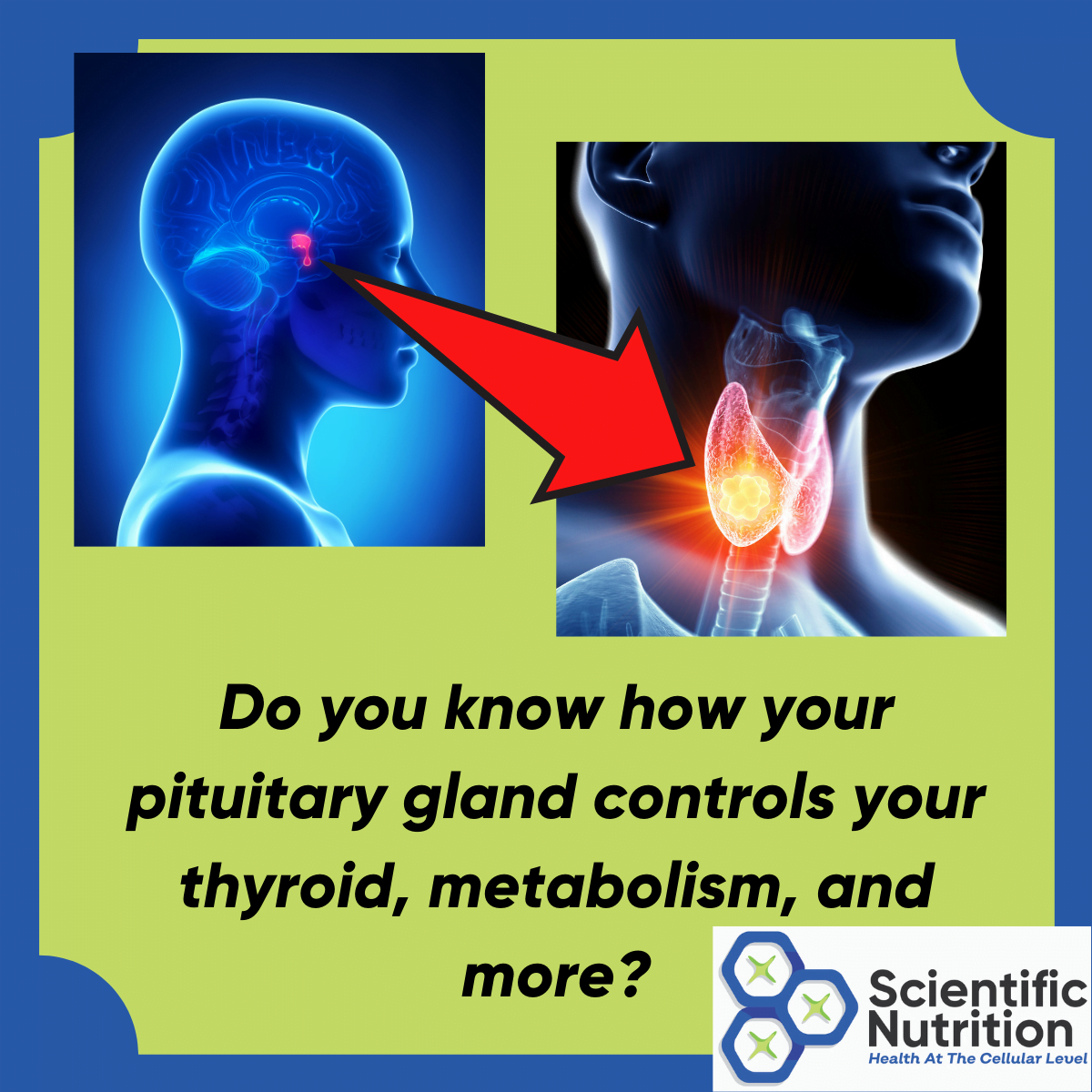Your thyroid function is not defined only by the thyroid itself.
A good TSH hormone level is not always the answer for measuring your thyroid function. It is just a part of the full picture. It can be affected by your hypothalamus, pituitary gland, cellular health, liver function, and all of the thyroid hormones in between.
Why is your pituitary important to your thyroid hormones TSH, T4 and T3?
Your pituitary is in charge of sending signals to your organs and other glands including adrenals, thyroid, ovaries, and testes. It helps to control metabolism (along with the thyroid), growth in puberty, sexual maturation, blood pressure, reproduction, and other functions.
This gland is made up of a tissue that is different than any other body tissue as it can hoard T3 (Triiodothyronine) hormones (energy) if you are starving for backup in a life or death situation to maintain your internal body functions. It begins the process of making T4 (Thyroxine).
Throughout this blog I have highlighted the hormone names to help you identify them and what functions they play in processes. I want to help you to familiarize yourself with the terms so you understand how important each step is with each piece of the puzzle.
Which hormones does the pituitary gland make?

The anterior/front of the pituitary gland produces the following hormones:
- Luteinising Hormone (LH) and Follicle Stimulating Hormone (FSH) are grouped as gonadotropins that stimulate ovaries to release eggs, menstrual cycles, and sperm maturity. Both of these hormones are made together in the same cell and will stimulate estrogen and testosterone. You may see LH or FSH on a blood work panel to check on these hormone levels. A high LH may reflect anxiety, depression, or mood disorders after completion of menopause or andropause (low testosterone) often called male menopause.
. - Prolactin stimulates breast tissue growth and lactation when a woman is nursing. High levels are linked to chronic kidney failure or cirrhosis). Low levels may cause decreased sex hormones and infertility.
. - TSH stimulates the thyroid to make your T4 hormone.
. - GH (Growth Hormone) regulates metabolism, growth, and body composition.
. - Adrenocorticotropic Hormone stimulates adrenal glands to secrete steroid hormones to turn on fight or flight. The adrenals then produce Cortisol to regulate metabolism and blood pressure. Cortisol is our anti-inflammatory hormone that can accumulate as belly fat in excess.
Your thyroid function process
If we review, the hypothalamus is the beginning of the process. It needs to tell the pituitary gland to get to work. Once the pituitary gets the cue of Thyroid-Releasing Hormone from the hypothalamus, it produces the TSH (Thyroid Stimulating Hormone). Both the hypothalamus and pituitary gland work together to adjust how much TSH is produced.
Pituitary dysfunction can be caused by many things included hypoglycemia, blood sugar dysregulation, insulin resistance, chronic stress, and even tumors. When these underlying issues are present the gland is not able to make enough TSH. Your thyroid function can affect your cognitive function including ‘brain fog’ and if it is <0.1 it can be a solid indicator of your risk of dementia.
When the TSH is high, the pituitary will slow or stop the production of TSH. A deficient amount of TSH made by the pituitary gland may be caused by a high cortisol level due to blood sugar dysregulation, insulin resistance, hypoglycemia (low blood sugar), or chronic stress.
Did you know your hormones T4 and T3 affect your TSH even though they are after the pituitary process?
What are some possible reasons for your TSH to at a low level?
With too much or high levels of the T4 or T3, your TSH level is suppressed as the body gauges it as having a good amount available or excess in your gut.
Even if you need more T4 or T3 due to a speed bump in the process like poor cellular receptors, it will suppress the production of TSH reflecting low values on your blood work.
I will explain possible causes and issues in a future article but most commonly, there are occasions where the T4 is not converted correctly to T3 (energy) causing high levels of T4 in the blood work.
This tells the pituitary to stop making TSH as well. In this case of high hormone levels, your TSH will be low because it doesn’t see the need to make more T4 or T3.
Too little thyroid-stimulating hormone (TSH) may cause:
- irregular or fast heartbeat
- weight loss
- insomnia
- sweating
- diarrhea
- frequent bowel movements
- sweating
- shakiness
- weight loss
- enlarged thyroid
- anxiety
- protruding eyes
- cognitive issues
- hot all of the time
you may have a low TSH level due to sub-clinical hyperthyroidism or fast metabolism.
What might be a possible cause of a high level of TSH?
If your T4 or T3 level is low, it reports back to the pituitary to increase TSH production. The demand on the pituitary gland for TSH will cause it to create more T4. It may be hyper-releasing excessive TSH to catch up and help to balance the downstream low amounts of T4 or T3 available.
It may sound confusing but you can have low thyroid hormone T4, low energy T3, yet a high TSH. In this case, we need to dig deeper to find out where the T4 is stuck or why it is not converting. Typically >4.0 mU/L or higher is sub-clinical hypothyroidism or slow metabolism, often with low T4 levels. High TSH levels can be the cause of elevated Cortisol, an anti-inflammatory hormone that may accumulate as belly fat in excess due to the early stage of adrenal fatigue. When the thyroid is exhausted it will rely on the adrenals to pick up the slack.
A simple way to look for a compromised thyroid may be:
- vertical white ridges on your nails (also involved with anemia)
- nail infections
- split and brittle nails
- slow nail growth or lifting
- fatigue
- dry skin
- cold hands/feet
- weight gain
- slow heart rate/palpitations
- irregular menses
- hair loss
The Office on Women’s Health reports that 1 in 8 women suffer from thyroid issues at some point and 59-63% of men with hypothyroidism also experience sexual dysfunction so it is not a concern to ignore.
If you feel you may be experiencing thyroid related symptoms, LET’S CHAT about your health goals!
Learn more about clues and possible causes of hypothyroidism symptoms.
In the next blog, we will move on to the Function of T4!
Copyright Scientific Nutrition, LLC 2021




